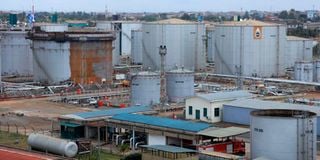Premium
More fuel pain looms on revised Kenya Pipeline Company depot tariffs

Kenya Pipeline Company petroleum storage facility in Industrial area, Nairobi in this photo taken on January 22, 2021. The government has handed KPC a lifeline after approving an increase in depot tariffs of up to 34.5 per cent.
What you need to know:
- Epra raises charges for oil marketers evacuating consignment.
- New charges are, however, lower than what the pipeline company pushed for.
- The extra costs will be passed on to consumers through higher fuel prices at a time fuel prices remain high.
The government has handed the Kenya Pipeline Company (KPC) a lifeline after approving an increase in depot tariffs of up to 34.5 per cent in a move that will help the State-owned energy firm to collect more cash to splash on big-money projects.
The Energy and Petroleum Regulatory Authority (Epra) has raised the depot tariffs for oil marketers evacuating fuel from KPC’s Nairobi fuel depot to Sh2,526.6 per cubic metre until July next year from Sh2,074.5.
The costs are passed on to consumers.
The tariff will rise to Sh2,582.72 per cubic metre from July next year and further to Sh2,791.85 in the following year.
The Epra-approved tariffs are however lower than what KPC sought after the energy regulator collected views of the public and other stakeholders.
KPC had sought to increase the transport and storage tariffs at its Nairobi depot from Sh2,074.5 per cubic metre of petroleum to Sh2,617.33 within year 2022/23.
The parastatal wanted the tariff to rise further to Sh2,799.98 in 2023/34, and Sh2,824.57 in 2024/25.
The old tariffs which ended last month had been in use since 2019 and are reviewed every three years.
The charges cater for the costs KPC incurs for pumping fuel through its pipeline, pipeline losses, the costs of evacuating the fuel to tankers, depot losses, and the costs of delivering the fuel to petrol stations that are within 40 kilometers of Nairobi.
“Notice is given pursuant to section 11(h) of the Energy Act, 2019 that the Energy and Petroleum Regulatory Authority has reviewed and approved the applicable KPC’s multi-year pipeline transport tariff for the tariff control period 2022/2023 - 2024/2025,” Epra Director-General Daniel Kiptoo said.
Oil companies evacuating in Nakuru will pay Sh3,149.25 per cubic metre until July up from Sh2,853.9, which will rise to Sh3,211.26 and Sh3,467.62 over the next two financial years respectively.
In Eldoret, the rate is Sh3,801.37 up from Sh3,669.56 and Sh3,869.56 and Sh4,175.37 in 2023/24 and 2024/25.
Meanwhile, those in Kisumu will pay Sh3,797.69 up from Sh3,664.95 and later Sh3,865.84 and Sh4,171.37 over the next two years in that order.
“The effective date of the above set of tariff fs is October 15, 2022, and subsequent adjustments for the next tariff control period will be July 15 of every year,” said Mr Kiptoo.
The extra costs will be passed on to consumers through higher fuel prices at a time fuel prices remain high.
KPC also aims to use the additional billions of shillings it aims to raise from the review to recover the costs it used to upgrade its pipelines and holding facilities.





